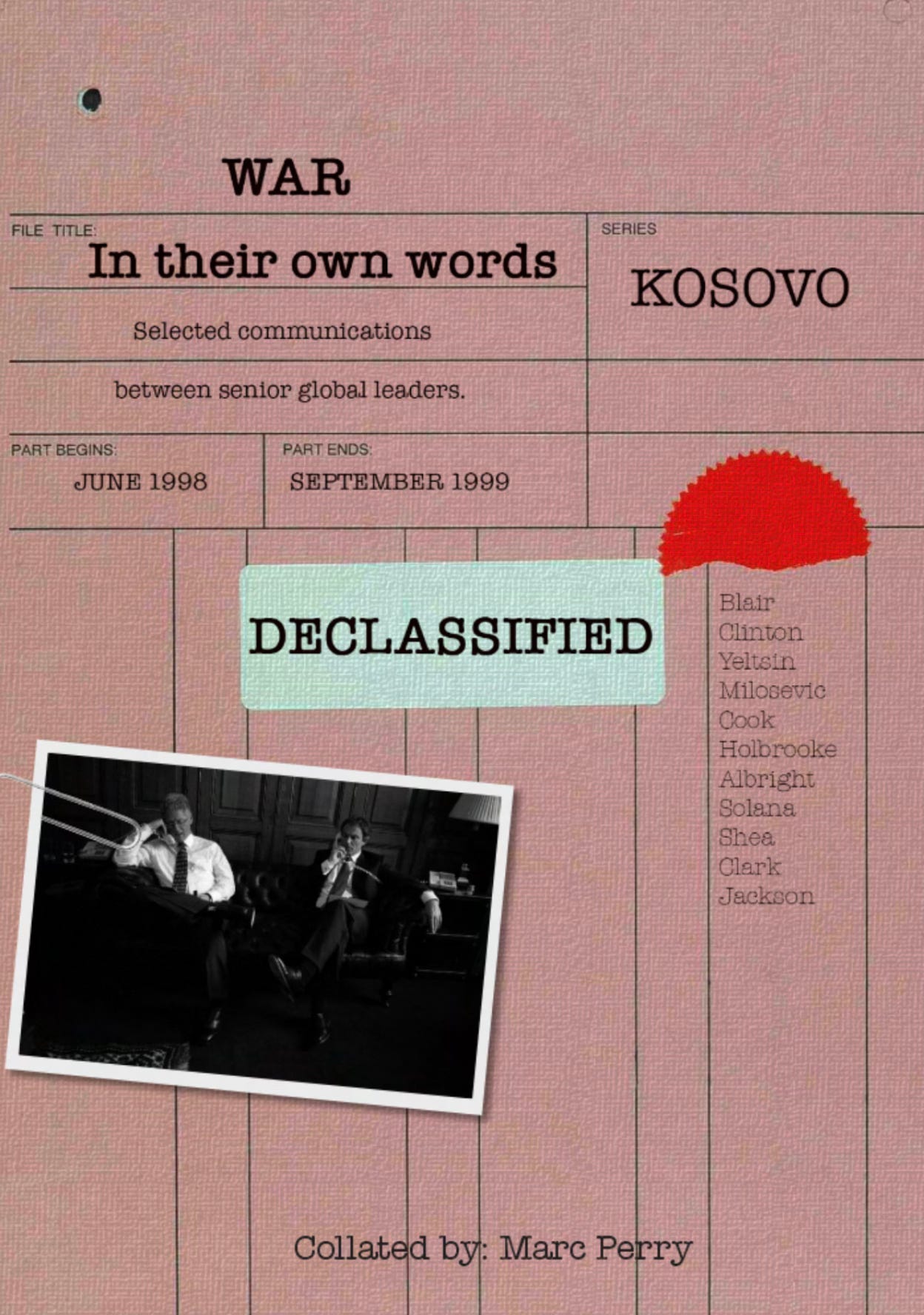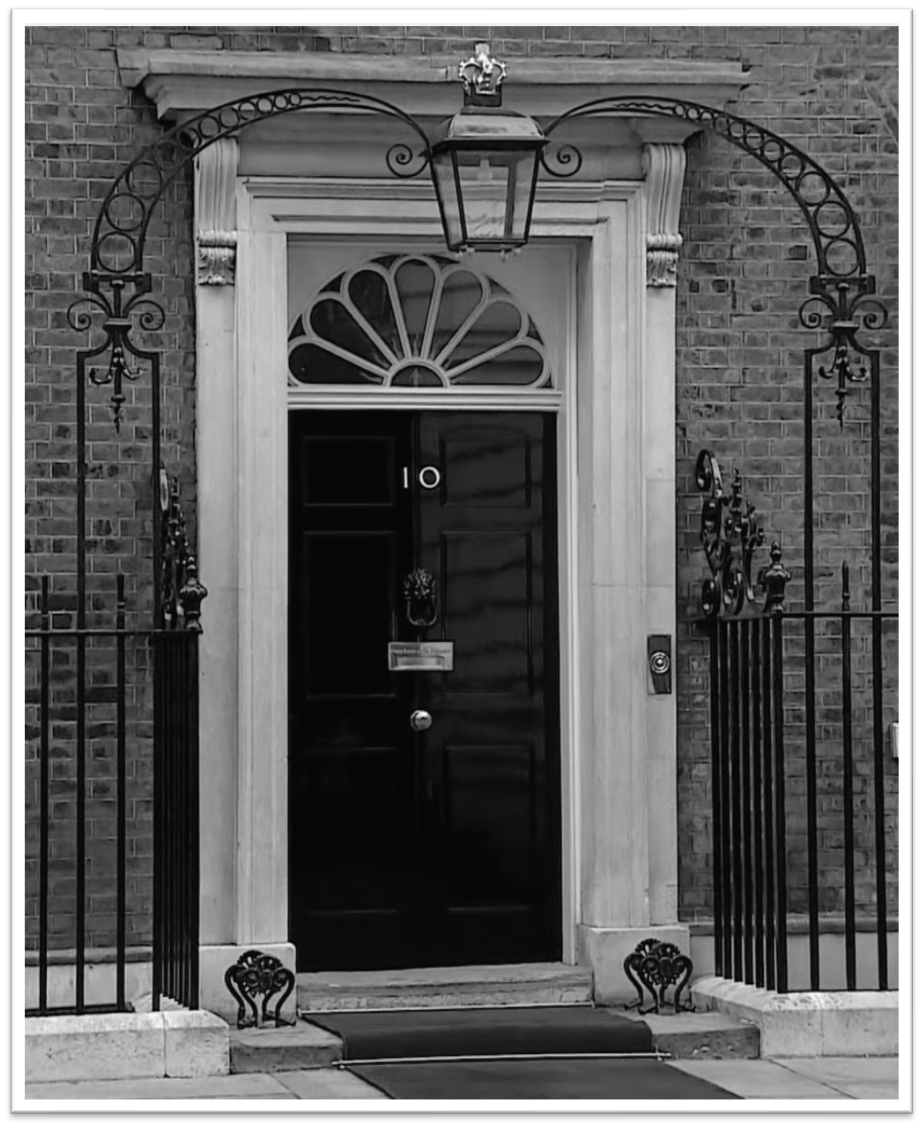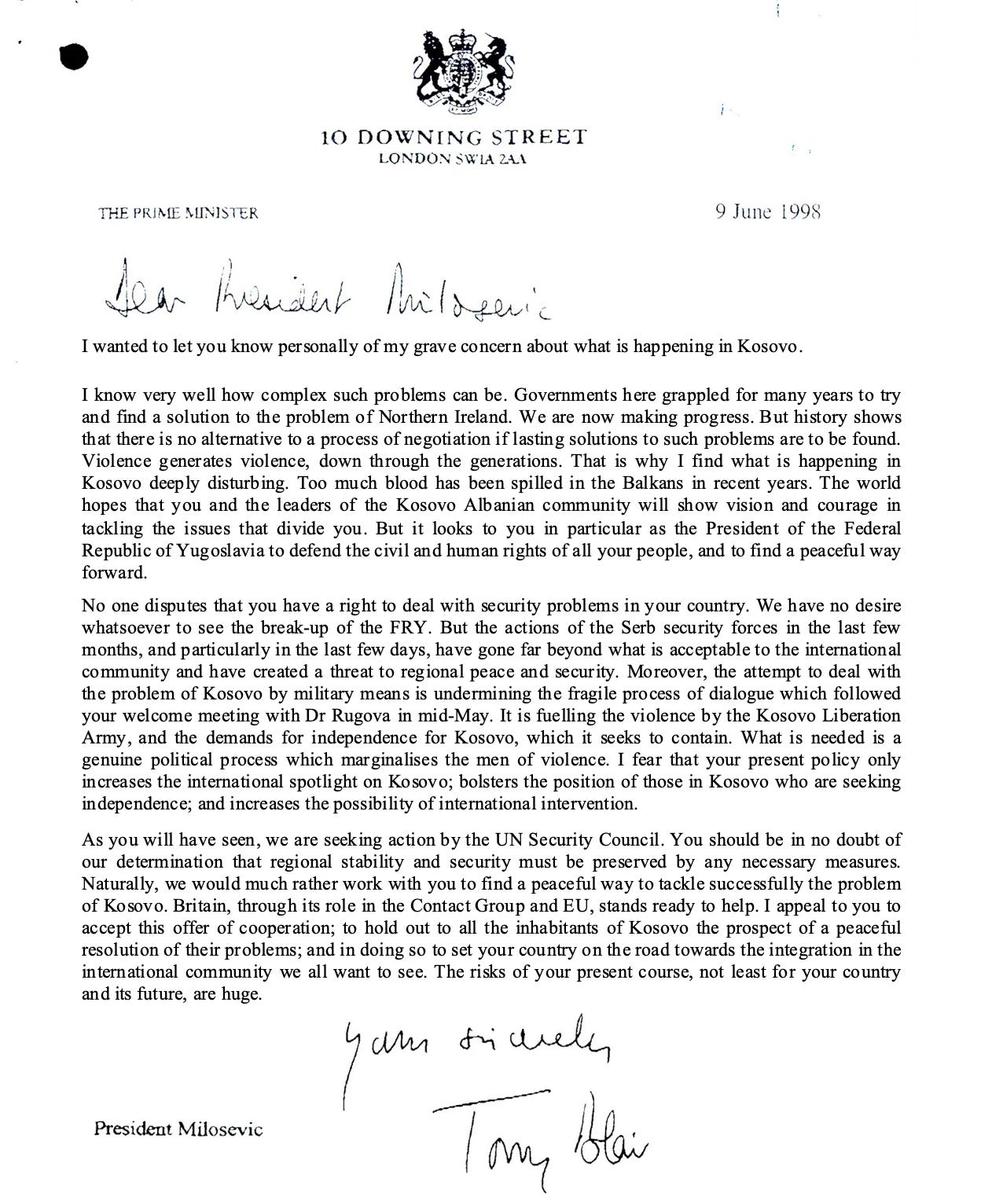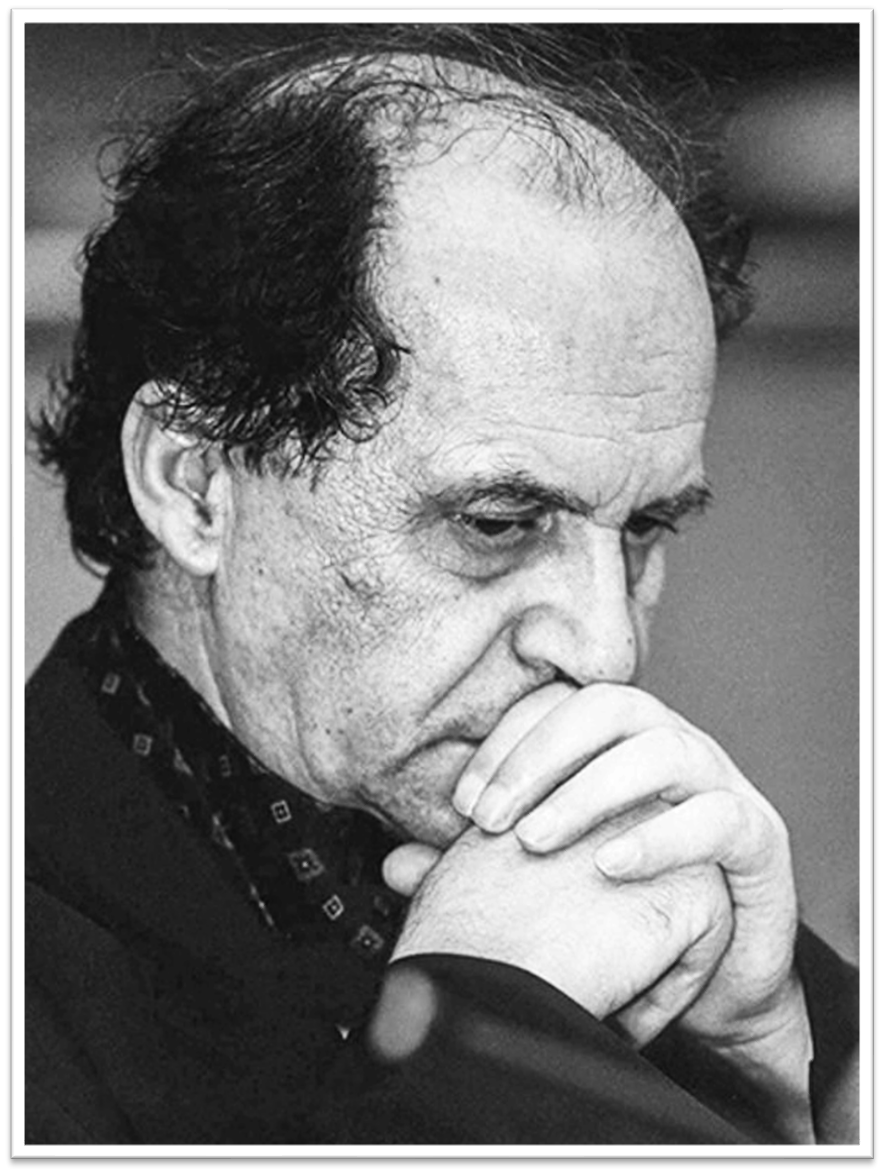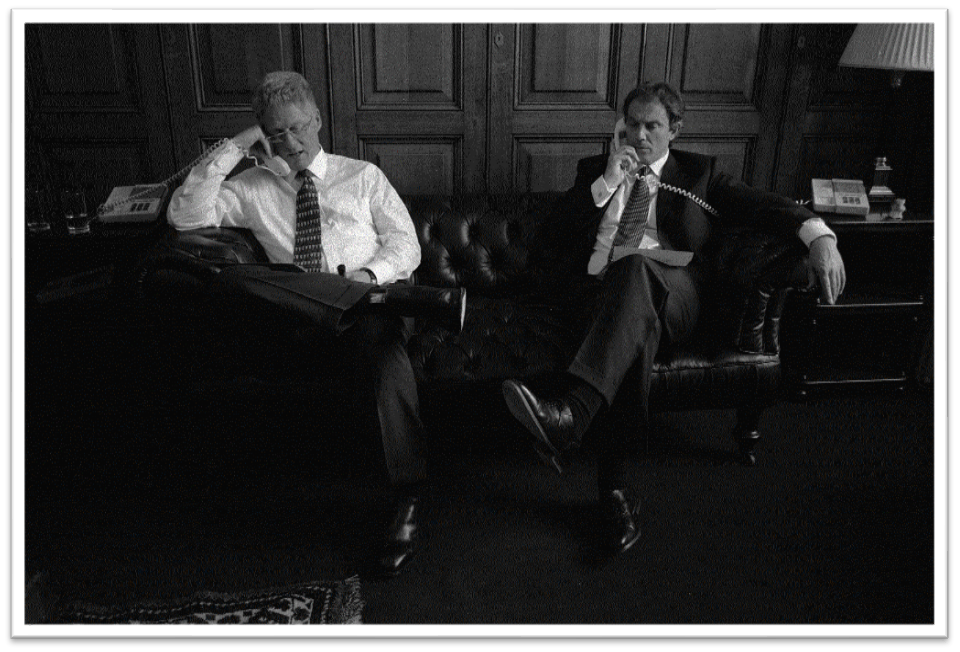Kosovo Declassified: War In Their Own Words
Selected conversation between senior global leaders, September 1998 - June 1999, set out as if in a play.
KOSOVO: WAR IN THEIR OWN WORDS
Selected Conversations Between Senior Global Leaders September 1998-June1999
Cover: Marc Perry
Copyright © 2025 Marc Perry. All rights reserved.
No part of this publication may be reproduced, distributed, or transmitted in any form or by any means, including digitally, or other electronic or mechanical methods, without the prior written permission of the publisher, except in the case of brief quotations used in reviews, articles, or other non-commercial uses permitted by copyright law.
For permission requests, please contact: perryeyes@gmail.com
Kosovo Declassified: War in Their Own Words is a revealing collection of chronologically arranged communications and conversations between senior global leaders, diplomats and military actors during the Kosovo war – arranged to unfold, as if in a play. Of interest to historians, diplomats, politicians, academics, journalists, soldiers and anyone else seeking deep insight into the details of the war.
Contents
June 1998, Pressing Problems: Blair-Milosevic; Blair-Rugova
July 1998, Credible Threat: Blair, Robertson and Cook; Blair-Clinton
August 1998, Gathering Support: Blair-Clinton; Blair-Yeltsin
September 1998, Ready To Hit Hard: Cook to Blair; Yeltsin-Blair; Blair-Milosevic; Blair-Yeltsin
October 1998, Bomb You Good: Blair-Clinton; Clark-Milosevic
November 1998, December 1998, Clashes Continue
January 1999, Massacre: Clark-Naumann-Milosevic; Blair-Clinton; Albright-Ivanov
February 1999, Going Bananas: Blair-Clinton
March 1999, Rambouillet: Blair-Clinton; Clinton to the Nation; Clinton-Yeltsin
April 1999, Bombs Away: Blair-Clinton; Blair-Clark; Holbrooke on Milosevic; Clinton-Yeltsin
May 1999, Ground Prepared: Blair-Clinton
June 1999, Deal at Dawn: Blair-Clinton; Clinton-Yeltsin; Clinton to the Nation; British hour-by-hour
July, August, September 1999, Demilitarized: Blair-Clinton. Clinton-Thaci
Epilogue: Jamie Shea; Speaking Frankly
FOI: List of UK Military and Personnel deployed
Abbreviations
ACTORD: Activation Order
FYR: Former Yugoslav Republic
G8: France, Germany, Italy, UK, USA, Canada, Japan, Russia
IMF: International Monetary Fund
KFOR: Kosovo Force
KLA: Kosovo Liberation Army (UCK)
KVM: Kosovo Verification Monitor
NATO: North Atlantic Treaty Organisation
OSCE: Organisation for Security and Cooperation Europe
SACEUR: Supreme Allied Commander Europe
SHAPE: Supreme Headquarters Allied Powers Europe
UNHCR: United Nations High Commissioner for Refugees
Introduction
“All the world's a stage,
And all the men and women merely players.”
- William Shakespeare.
The stage is Kosovo at the turn of the 20th century. The actors are an extraordinarily aligned cast of political personalities satelliting in powerful orbits, united in a common purpose: stopping a bully bent on ethnic cleansing. But this is no play, this is bloody war. Demonstrating trans-Atlantic cooperation at its most urgent and real Madeleine Albright and the foreign ministers of Britain, France, Germany and Italy hold five-way conferences call almost every day. “Never before had there been such a combination of modern technology and political will,” remarked Albright afterwards.
So, what do we learn from reading the letters, telephone transcripts and recollections of leaders involved in the Kosovo war? Undoubtably, each of us will take different things away from personal readings of these releases, but some common insights stand out:
Taking centre stage throughout this reading is the highly effective Blair-Clinton relationship. In 1998 Tony Blair was initiating his second year as British Prime Minister on a platform of political centrism, progressive Europeanism, pluralism and tolerance. Clinton was in the second year of his second term delivering policies based on a centrist “third way” political philosophy. Blair’s politics and that of his partner, were ideologically united on building an international consensus on issues from the Balkans, to peace in Northern Ireland to free trade. In the early days of his political ascendancy Blair spoke of standing for: “Co-operation, not confrontation; for fellowship, not fear.” And as the record here speaks, he would collaborate with Clinton in building a unique international consensus.
Crucially, Clinton and Blair are trained lawyers, and as their conversations show, they both know how to play hard for high ideals enacted through hard-nosed realism. Both are highly intelligent, articulate and able to navigate complexity with a strong sense of statesmanship. Both have rock star-like ambition and Clinton, in particular, is concerned with leaving behind a legacy. Blair may have been the junior partner, but he vigorously pushes for the commitment of ground troops and his securing of British boots on the ground allowed Clinton to leverage similar USA commitments. Both leaders understand the political power of media presentation and are constantly striving to give voice to the refugees and other victims of violence. They are quick to realise that if ethnic cleansing increases after bombing it will look like they caused it: “If we take the imitative and he moves against the people it will look like we caused it,” says Clinton. As expected, Milosevic uses the bombing to intensify expulsions and declare: “everybody is running away because of bombing, Serbs, Turks, Gipsies, Moslems, deer are running, birds are running…bees are running.” Both Blair and Clinton are emotionally invested in the welfare of the refugees. They visit the camps and busy themselves finding finances to fulfil their responsibilities to them.
Within their conversations allusions to “another option,” where NATO would commit a much bigger military ground force of 175,000 to 200,000 personnel, are made. This, assumedly, is the force that would be required to take Milosevic out of power should he not capitulate. Clinton and Blair repeatedly reiterate that winning is the only option. They foresee Serbs out, NATO in, refugees home. They foresee Milosevic before a court. They, with Chirac, even deal in the details of targeting strikes. And, when victory is eventually secured, they concern themselves with seeking out the best people to set up and run a new government; as Clinton tells Blair: “There are literally thousands of detail questions that we [still] have to answer.”
The astonishing levels of responsibility they were dealing with are brought into full-focus when we consider that Kosovo was not the only issue on their desks. They were simultaneously managing the Northern Ireland Peace process, Iraqi weapons inspections, a US-EU banana trade quarrel, and the Monika Lewinsky scandal. Remarkably, despite these heavy responsibilities their sense of humour remains intact. Clinton often wanders off topic, joking about bananas, nakedness and cashmere sweaters; while Blair, often acting the straight man, jokes about executing the person who accidently dropped the telephone line.
Through reading these releases we learn more about the personalities of the “internationals” than we do about the Albanian contingent. We do, however, learn that the British Foreign Office feared for President Rugova’s life. As the more moderate arm of Albanian opinion, they justifiably worried the more militant wing could take him out. Madeline Albright throws some light on the characters of the Albanian delegation in her autobiography, pegging Thaci as the brilliant young student with a penchant for turning his homework in late, Rugova as the eccentric academic and Veton Surroi as the pragmatist. Early on in the Rambouillet talks the UK and USA were confident of getting the Albanians to sign on the dotted line despite potential problems, “where we have both sides pissed at us.” Early on too, both Blair and Clinton envision an autonomous, rather than independent Kosovo. They do not want to fight the KLA’s war or have anything to do with a Greater Albania. Clinton and Blair also decide to pressure the KLA into taking responsibility for breaking cease fires, coming to the negotiating table, and disarming.
The releases do reveal more about the character of Milosevic. We read that past experience had taught Clinton that the Serbian President, “will cheat and jerk us around.” As early as the early autumn of 1998 Blair, Clinton and their advisors were convinced that an ultimatum, backed by force was the only means of getting him to pull forces out and come to an agreement on autonomy for Kosovo. Though he tries to lie and deny about his motives Milosevic talks openly about historic ethnic cleansing. In a memorandum regarding Milosevic’s character Richard Holbrooke amusingly describes his downfall amongst political peers on the global stage: “He will never again eat the Packy's All-Sports Bar in Dayton,” he remarks. And in the final hours before bombing Clinton doesn’t mix his words either: “Holbrooke is on his way back. Milosevic stiffed him. He wouldn't agree to a cease-fire.”
Much more still is revealed about the emotionally expressive character of President Yeltsin. We read that Clinton is aware of how bombings will politically hurt the Russian President and so he works particularly hard at keeping him close. The Russians agree to turn a blind eye to the threat of force, as long as it brings about a political solution without using force. They are, however, extremely agitated by the eventual bombing campaign: “NATO have made a big mistake,” says Yeltsin. Despite this Clinton, Albright, Yeltsin, Chernomyrdin and Ivanov prevent disagreement on Kosovo from ruining the American-Russian relationship in other areas, such as economic cooperation and nuclear arms reduction.
On March 24 1999 Clinton throws the ball into Yeltsin’s court: “It will be your decision if you let this bully [Milosevic] destroy the relationship we worked hard for six and a half years to build up,” he says. Yeltsin, meanwhile, confides his fears about growing anti-Americanism in Russia and of a ‘communist’ clamour, “calling for an unleashing of a European and world-wide war.” In response the Russian President appears to de-escalate military options by declaring: “Any General that speaks of sending troops to help Milosevic will be summarily dismissed from the military.” Despite resisting pressures to respond to NATO’s bombing campaign Yeltsin’s internal split at home spills out in an emotional exchange over the timing of bombing cessation: “Do not push Russia into this war. You know what Russia is. You know how it is equipped, but don't push Russia into this!” he says to Clinton. Later, Yeltsin is much more concerned with being perceived as a peace broker: “We shall continue efforts to work together so it looks like we stopped the European war, the World War,” he says. And, when all the efforts eventually pay off Yeltsin effusively says to Clinton: “So, I would like to hug and kiss you, and I am sincerely glad that in such a difficult situation our friendship wasn't broken.”
As an addition to the narrative, I have included a day-by-day account from the perspective of ‘boots on the ground.’ Here, I must confess a selective bias: as the man leading the ground force was British, and I am British, my focus singularly recalls the experience of British boots. In the theatre of war that follows, I endeavour to allow them, and all the politicians, diplomats and military men involved, to speak for themselves. Through words and actions, all of the “actors” within this “play” display the full range of human characteristics: some are genial, some are heroic, some are bloody-minded, some are all three at once; while all, without exception, are flawed. [Blair became messianic, Holbrooke arrogant, Jackson liked a drink, and Clinton, well, we all know about Clinton’s weakness].
Dramatis Personae
Madeline Albright: (61) US Secretary of State.
Anthony “Tony” Blair: (45) UK Prime Minister.
Gen. Wesley Clark: (54) Supreme Allied Commander Europe.
William “Bill” Clinton: (52) US President.
Richard Holbrooke: (57) US Special Envoy.
Lt. Gen. Michael Jackson: (54) Commander Allied Rapid Reaction Corps.
Slobodan Milosevic: (57) President of the Federal Republic of Yugoslavia.
Hashim Thaci: (31) Commander Kosovo Liberation Army.
Boris Yeltsin: (67) President of Russia.
Other key characters:
Martti Ahtisaari: UN Special Envoy for Kosovo.
Kofi Anan: UN Secretary General.
Louise Arbour: Chief Prosecutor; Criminal Tribunal Former Yugoslavia.
Samuel “Sandy’ Berger: US National Security Advisor.
Alastair Campbell: Chief of Communications to Tony Blair
Victor Chernomyrdin: (Russia) Special Envoy for the Balkans
Jacques Chirac: President of France.
Robin Cook: UK Foreign Secretary.
Massino D’Alema: Prime Minister of Italy.
Al Gore: US Deputy President.
Charles Guthrie: UK Chief of the Defence Staff.
Igor Ivanov: Foreign Minister of Russia.
Hemlut Kohl: Chancellor of Germany.
Klaus Nauman: Chairman of NATO Military Committee.
Yevgeny Primakov: Prime Minister of Russia until May 12 1999.
James Rubin: US Envoy / Assistant Secretary of State for Public Affairs.
Ibrahim Rugova: President of Kosovo.
Jacques Santer: President of the European Commission.
Jamie Shea: NATO Spokesperson
Lt. Gen. Michael Short: NATO Joint Air Force Commander.
Javier Solana: Secretary General Of NATO.
John Sawers: UK Diplomat, Foreign Affairs Advisor.
William Walker: US Ambassador, Head of Kosovo Verification Mission.
Background Chronology:
1987 Slobodan Milosevic's power grows with a trip to Kosovo. At large public rallies, Serb nationalists embrace him when he promises to defend their interests in the province.
1989 Milosevic changes the Serbian constitution to vastly reduce the provincial autonomy Kosovo has enjoyed since 1974. Other measures put tens of thousands of Kosovar Albanians out of work and restrict the activities of their cultural organizations. Rioting and protests by Kosovo Albanians ensue.
21 November1995. The Dayton Accords end war in Bosnia but leave the Kosovo question unresolved.
1996. The KLA appear and take their first actions against Serb forces.
26 November 1997. First front-line action by the Kosovo Liberation Army (KLA) against Serb forces in Drenica.
5 March 1998. Prekaz massacre. Following the deaths of four Serbian policemen Serb forces surround and shell the home of KLA leader Adem Jashari, killing over 60 family members.
7 March 1998. Rome. Madeleine Albright declares, "We are not going to stand by and watch the Serbian authorities do in Kosovo what they can no longer get away with doing in Bosnia."
9 March 1998. "Contact Group" countries (United States, United Kingdom, France, Germany, Italy and Russia) meet in London to discuss Kosovo.
23 March 1998. Ibrahim Rugova re-elected "President" of Kosovo with 99% of vote in controversial elections boycotted by increasingly popular Kosovar Albanian hard-liners.
31 March 1998. United Nations Security Council resolution 1160 condemns Yugoslavia's excessive use of force, imposes economic sanctions, and bans arms sales to Serbia.
15 May 1998. Rugova-Milosevic meet in Belgrade.
29 May 1998. As a part of the international community’s move to bolster Rugova’s plummeting support at home he meets with Clinton and Albright in the Oval office.
9 June 1998: Blair writes to Milosevic…
June 1998 Pressing Problems
11 June 1998, Milosevic replies to Blair:
Dear Mr Blair,
Referring to your letter of 9 June 1998, I should like you to have in mind the following essential elements of our policy: Our orientation to resolve all issues in Kosovo and Metohija through direct dialogue and by political means, while respecting the integrity of Serbia and guaranteeing equal civil and human rights to all those living there, regardless of their nationality, ethnic origin or religion, is very clear. Such a principled starting-point emanates from the multi-ethnic nature of Serbia and Yugoslavia as a whole.
In this respect, we accept the existing European standards, in particular those built into the Framework Convention for the Protection of National Minorities of the Council of Europe. In this approach we have never equated our citizens of Albanian nationality with leaders of separatism, let alone with those advocating or practising violence and terrorism as a means of attaining political goals. The philosophy of division is characteristic, as I believe you are aware, of the leaders who publicly call for the secession of Kosovo and Metohija from Serbia and who impose on their fellow Albanians the boycott of the civil and political rights granted to them under the Constitution and the laws by blackmail, and who promote segregation of education, health and other ideas belonging to the distant past.
From our territory no threat to any of our eight neighbours or to our region, has ever been posed nor it poses, least of all, a threat to peace and security. Yugoslavia has always been open to comprehensive cooperation with its neighbours and with all other countries and international organisations. It is open to such cooperation even today, on an equal basis. This is its lasting orientation. Such a policy is particularly demonstrated in practice through our good-neighbourly cooperation and philosophy of open borders in continuous efforts to promote our relations with the European Union and to restore our membership rights in the Organisation for Security and Cooperation in Europe which have been suspended with the known and now formally outdated explanation, contrary to the procedure based on the principles of this Organisation.
In your letter you say that no-one is questioning the right of the State to cope with its security problems. This is precisely the case. Police in Kosovo and Metohija are taking only those measures and actions which are deemed necessary to protect the physical security of people and their property. It is a special responsibility of the State to prevent terrorism and banditry. The recent action by police you referred to, was limited to lifting the blockade of regional communications. In doing so, they have inflicted no losses among the civilians and the communications were unblocked and now operate normally. More than 60 foreign representatives were able to see it for themselves when they visited the region on 7 June, as well as several dozen foreign news correspondents during their visit on 10 June. Naturally, foreign representatives accredited in Belgrade, foreign correspondents, international and other aid organisations can still freely travel to Kosovo and Metohija and carry out their mandated duties. We believe that this will serve greater impartiality and an improved understanding of both the situation and our policy.
Taking into account the long tradition of friendly relations, respect and understanding between our countries and peoples, I sincerely regret to have to say that we are deeply surprised by some of the positions of your Government regarding Yugoslavia and, in this context, in particular by your initiative and action in the United Nation Security Council to pass a resolution against Yugoslavia. We see none of the reasons indicated as a basis for taking such a move. Therefore, we wonder whether it is possible that you have not been informed of the actual situation in Kosovo and Metohija and that the fundamental meaning and implications of separatism and terrorism in this part of Europe are not understood. Indeed, what could have been the reason for you to refer to the terrorists, in your letter, as the Kosovo Liberation Army and to fail to mention at all terrorism, whose existence in Kosovo and Metohija you do not, I hope, doubt. What could be the reason for the oversight that the substantial dialogue begun at my personal initiative and that of the Government of Serbia, having agreed and publicized modalities, is avoided precisely by those leaders who publicly espouse separatism?
In conclusion, I should like to emphasize our assessment that the initiative to impose sanctions and exert continued pressure on Yugoslavia represents support to those forces asking for public striving to undermine the territorial integrity of Serbia and the Federal Republic of Yugoslavia. These are, understandably, not the values subscribed to by the Government or its leaders, but rather by all the population of this country.
Slobodan Milosevic
11 June 1998. NATO defence ministers begin conceptual planning for potential intervention in Kosovo. Ministers decide to "send a signal" to Milosevic by conducting air exercises in the region. Blair and Rugova at 10 Downing Street:
The Foreign Office reports Rugova’s position: “Rugova said that there was already a legal basis for international action because Kosovo had been part of Yugoslavia, but Yugoslavia no longer existed. There was also a humanitarian basis for action and if something was not done soon, he feared a catastrophe. The Prime Minister asked whether the situation was getting worse. Rugova confirmed that it was. After presenting the Prime Minister with two pieces of Kosovan rock crystal, Rugova concluded by saying that, although Kosovo was a small country, they wanted independence.”
Foreign Office officials fear threats on Rugova’s life:
“Rugova's standing in Kosovo political circles was on a steady downward course even before his agreement to meet with Milosevic last month. Milosevic's repression has radicalised a large part of Kosovar opinion, and there is a growing wave of support for independence. Rugova's policy of dialogue is putting his position, and possibly even his life at risk.”
15 June 1998. 85 NATO warplanes fly over Albania and Macedonia in a show of force called Operation Determined Eagle.
23-24 June 1998. Holbrooke meets with Milosevic and travels to Kosovo to talk directly with KLA commanders.
23 June 1998. During a confidential visit to Albania UK envoy and former Royal Marine Paddy Ashdown observes extensive Serb shelling, mortaring and machine gun fire on Albanian farms and refugee gathering points in Kosovo from a vantage point in Albania north of Gjkakova.
June 27 1998: Ashdown passes on the Albanian government’s view of the KLA, in a final report back to Blair:
“They believe that the KLA remains a largely dispersed organisation, based on a village protection system with little or no overall command and control and no political direction. This is on the way to being formed, however and will be established over the coming weeks and months.”
July 1998, Credible Threat
31 July 1998, Downing Street, London. Blair meets with Defence Secretary Robertson and Foreign Secretary Cook. Private Secretary John Holmes reports:
“The Prime Minister said that Milosevic had to know that he would be hit if he went on the offensive against civilians. As for the KLA, we had no realistic military options against them, but they had to understand that we were bound to be less tough on Milosevic if they were too active militarily themselves. The only way to bring the two sides to compromise was by demonstrating that the international community would not let either side win militarily. They could of course fight each other to a standstill, but it was in the best interests of both to come to the negotiating table now. It was therefore important for us to get sensible compromise proposals on the table as soon as possible, while getting the message across that we would not help either side win the military struggle. In particular, the Kosovar Albanians needed to know that we would not fight their independence war for them, or countenance any Greater Albania strategy on their part. He was inclined to think that we should be more explicit about this strategy, since our current public position lacked clarity and was in danger of sending the wrong signals to the parties.”
31 July 1998. Private Secretary Philip Barton records a Blair telephone call with Clinton:
“The Prime Minister had a brief discussion with Clinton on Kosovo. The Prime Minister said that Chris Hall was doing a good job. He understood he was shortly going to put forward a plan in conjunction with the Contact Group. We should set out to the KLA and Milosevic what we wanted i.e., for Kosovo to be an autonomous republic in the Former Republic of Yugoslavia (FRY), rather than independent. We should make clear that this was our plan. If Milosevic tried to eliminate the KLA, we would go for him, while if the KLA continued to fight for independence, we would go easy on Milosevic. The sooner Hall came up with his plan the better. Clinton agreed. The Prime Minister said that originally Milosevic had been the clear aggressor. But in the last three to four weeks the KLA had started to do quite well. The situation had become more complicated and nuanced. Milosevic had now won back some territory in part because we had taken our grip off his arm. He had been able to open up some roads and so on. Now was the time to propose a diplomatic solution and to make clear to both sides what we wanted to happen. Returning to Kosovo at the end of the conversation, Clinton said that he would follow up what the Prime Minister had said.”
31 July 1998, East Hampton, New York…
Blair: Bill, a couple of other things. Kosovo. xxxx*
Clinton: I agree.
Blair: xxxx*
Clinton: The KLA has put us in a tough position.



